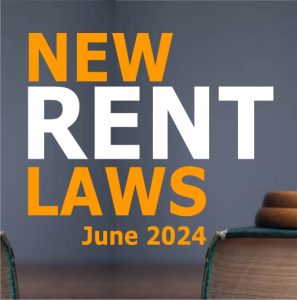In June 2024, the Queensland government pushed through new rental law changes with very little community consultation. The key changes of these new laws are as follows:
- RENT PRICES
It is now illegal for agents or owners to accept offers from tenants applying for rental properties to pay more than the advertised amount. There is no limit placed on the actual rent amount, it is just that once advertised, that is the amount that has to be accepted.
- RENT PAYMENTS
It is now illegal for agents or owners to accept offers from tenants to pay more than 4 weeks rent at the start of a new tenancy. Once the initial 4 weeks has passed, tenants can pay in advance as much as they like.
The purpose of these two changes above is to ensure that tenants with lots of money are not prioritised ahead of other eligible tenants who have less readily available funds.
- RENT INCREASES
Rent increases for all properties are now limited to no more than once per 12 months, and tenants must be provided with at least 2 months prior written notice of any rent increase. Historically, two or three months prior to the end of a lease, new rent amounts would be established, and the current tenant (or new tenants) would be offered a new lease at the new price. The time that had elapsed since the previous rent increase was irrelevant. That has now changed.
Rent increases are now fixed to the property – not the tenant. All new lease must contain the date of the previous rent increase for the property, and documented evidence must be available to all tenant applicants to substantiate that date.
Therefore, the rent for a new, or existing lease can only be increased if it can be proven that it has been 12 months or more since the property has a previous rent increase. That sounds pretty simple, but it gets complicated.
Example 1 (Simple)
Tenant (A) commenced a 12-month lease on 5 March 2024 and vacates on the 4 March 2025. A new lease can be offered to Tenant (A) or a new Tenant (B) with a rent increase as of 5 March 2025 because it has been at least 12 months since the property had a rent increase. Please Note: In reality a new lease with a new Tenant (B) never starts the day after Tenant (A) vacates because of the need to conduct an Exit Inspection and send the report to Tenant (A) and then allow Tenant (A) to return to the property within a ‘reasonable time’ to correct any issues, but for the sake of this exercise, we’ll ignore that point at the moment.
Example 2 (Not as Simple)
Tenant (A) commenced a 6-month lease on 5 March 2024 and vacates on 4 September 2024. A new lease commencing 5 September 2024 is then offered to Tenant (A) or to a new Tenant (B). If the new lease is for 6 months, the rent cannot be increased because it has not been 12 months since the first rent increase (5 March 2024). If the new lease is a 12-month lease from 5 September 2024 to 4 September 2025, the new lease agreement must commence on the original rent amount but can include a rent increase half way through the lease on 4 March 2025 as it is then 12 months since the last increase, on the conditions that the vacancy was advertised with the scheduled rent increase known to tenants, the lease agreement details the scheduled increase, and the tenant receives ‘additional separate written notification’ of the rent increase at least 2 months before the increase is scheduled to occur. (Simply detailing the rent increase in the lease agreement does not satisfy the requirement of ‘additional separate written notification).
Example 3 (Complicated)
Tenant (A) commenced a 12-month lease on 5 March 2024 and is due to vacate on 4 March 2025, but breaks the lease and vacates the property after 10 months on 4 January 2025. The property is readvertised and after 2 weeks, a new Tenant (B) signs a lease and enters the property on 18 January 2025. Tenant (B) will start the tenancy on the original rent but will require 2 months separate written notification of a rent increase, and so the rent cannot be increased on Tenant (B)’s new lease on 4 March 2025 as anticipated. The rent can only be increased 2 months after the lease started, which is 19 March 2025. In this instance, the rent amount could not be increased until 12 months and 2 weeks have passed. Any subsequent lease will then have to be based on the new 19 March 2025 rent increase anniversary date.
There are many examples that now occur which are much more complicated than these, but you get the idea!
As can be seen, the new laws have made the original fairly straight-forward rent increase process into an administrative nightmare.
Mid-term rent increases on leases will become the norm. Similarly, rent increase dates will often be pushed back beyond the 12-month period by 1 or 2 weeks or so, due to the need to provide tenants with ‘additional written notification’ of a scheduled rent increase.
Not surprisingly, agencies and property managers are frustrated with the complexity of the new rent increase rules, and owners are often confused and sometimes angry about them, and there is virtually no gain for tenants (who are often as confused as everybody else).
There are currently no rules restricting the size of rent increases, but an existing tenant has a right to appeal a rent increase if they intended to stay in the property and they believe a proposed rent increase is unreasonable or beyond market value.
It is important to always listen to, and take the advice of your property managers. They are the experts who fully understand how to properly implement the new laws, how to protect you from being taken to QCAT for a technical breach, and how to integrate the changes with previous existing laws that also impact lease agreements eg: the perils of periodic leases or domestic violence rights of tenants.
The Queensland government, the Residential Tenancies Authority (RTA) and the Real Estate Institute of Queensland (REIQ) have all made it very clear that HUGE fines will be applied to owners, property managers and agencies who deliberately or unwittingly attempt to flout or bypass the new laws.
PLEASE NOTE:
THE QUEENSLAND GOVERNMENT HAS ALSO INDICATED A FURTHER ROUND OF ADDITIONAL NEW LAWS TO BE ANNOUNCED IN SEPTEMBER 2024 – STAY TUNED!!

